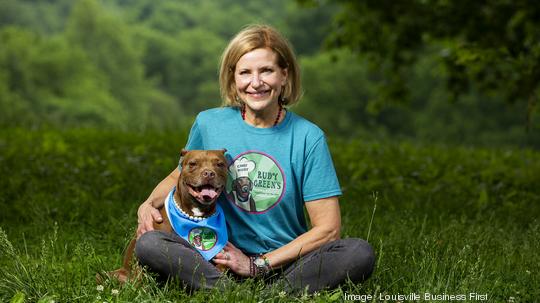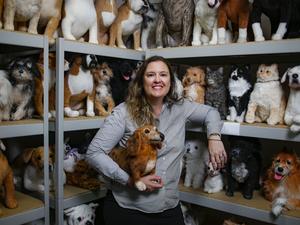
Karla Haas was hysterical when she carried her big moose of a dog, Rudy Green, out of the veterinarian's office in 2006.
She had just been told that he couldn't eat regular dog food due to a bleeding ulcer that nearly took his life. But at the recommendation of a nutritionist, she started feeding him beef liver and brown rice. The change was significant.
"My head spun around," Haas said, noting that up until that point, she had been told to never feed dogs anything but dog food. "It led me to do a lot of research on pet food, how it's processed, the ingredients used in it and how to improve on it."
That was the genesis story of Rudy Green Inc., a human-grade pet food company Haas founded and named after her beloved dog. She set off with a mission to change the way people thought about feeding their pets, while also donating a percentage of sales to help animal shelters and rescue groups.
Haas had to start from scratch when it came to both the recipes and the market. Back in 2006, no one considered feeding their dogs anything other than kibble. Fresh and frozen pet food companies like The Farmer's Dog and Ollie weren't founded until a decade later, and stores didn't even have options to sell refrigerated or frozen pet food.
"We basically pioneered this human-grade, home-cooked movement that is now an important part of the marketplace," Haas said. "Sixteen years later, I feel like I've done what I've set out to do with this company. I couldn't be happier to see all of this competition and how many companies are doing home delivery and human-grade food. That's exactly what I meant to do."
Now she's selling the business she worked so hard to build in hopes that it might continue to grow. She's still looking for the right buyer.
Starting from scratch
When Haas was just starting out, she was working out of the FB3 Development food incubator on Market Street, where Harvest restaurant used to operate. Matt Jamie, founder of Bourbon Barrel Foods, was also there, along with Rooibee Red Teas and a few other businesses.
She was sending samples of the recipes she created to labs for testing, each one costing several thousands of dollars before she could ever take it to market.
Haas later got her own commercial kitchen on Barret Avenue and hired employees to help run the business, before she eventually found a manufacturing partner that could help her make Rudy Green's products at scale, which lowered the cost.
But she still had another issue to face — retailers.
"Pet speciality stores, up until very recently, were not equipped to retail this product," Haas said. "While they've had raw frozen products for several years, they didn't welcome and embrace this brand or this concept."
Haas said part of the reason for that was because retailers saw human-grade pet food products as a disruption or threat to longstanding dry and canned brands. Rudy Green was trying to complement those other options, not replace them, Haas said.
Rudy Green's products have no added vitamins or supplements, just the ingredients themselves — such as beef, pork, chicken, turkey, fish, brown rice, carrots, peas and spinach — so it's meant to be a part of a well-balanced diet.
Selling to grow
Today, Rudy Green's Doggy Cuisine is sold in 200 retail stores, most of which are out-of-state Kroger locations. Locally, products can be found at Pet Wants in Jeffersontown and Norton Commons, Valu Market in Mid City Mall, Give a Chance Boutique in Shelbyville and in the frozen food aisle at Kroger locations in the Highlands, Hubbards Lane and Holiday Manor. It's also available direct-to-consumer, via the company's website and Amazon.com.
Aside from its regular product line, Haas has also found success using software to develop custom diets for dogs struggling with specific diseases and ailments, such as cancer and kidney disease, and for exotic animals, too. She created the Maned Wolf diet for a sick maned wolf named Sadie at the Louisville Zoo, and that care system has since been purchased by other zoos, including the Smithsonian National Zoo.
Haas declined to disclose revenue, but noted Rudy Green is delivering to hundreds of homes annually, in addition to its retail sales.
"The most valuable thing about this brand is its transparency. It's trustworthiness. It's longevity," Haas said, noting the business has been totally bootstrapped, and she is the majority owner.
From Haas's perspective, all it really needs to thrive is financial and marketing support.
"It really needs a lot of money to make it available for everyone, everywhere, on retail shelves and on doorsteps," she said. "I'm willing to stay with the brand, or I'm willing to walk away.
"But now the time is the right for the big pet food industry and pet specialty retailers to realize that this little movement we created in 2006 is here and it's not going away."









